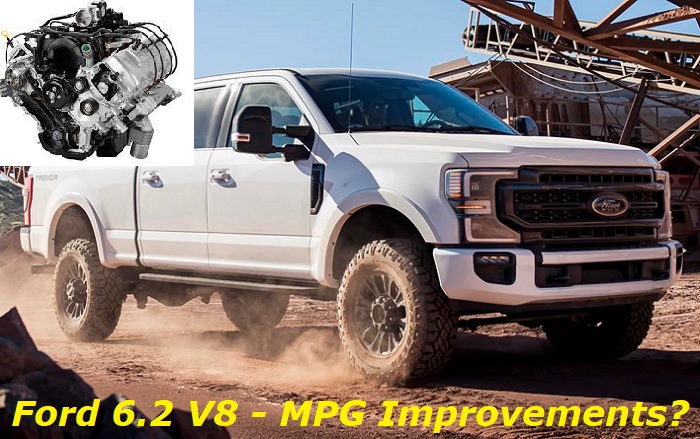When it comes to big engines, the Ford Boss engine is the real boss. It's the V8 engine which is also called Hurricane. It has a marvelous displacement of 6.2 liters, wonderful power of up to 500 horsepower, and splendid torque of up to 477 lb-ft. What else will you want for your vehicle? Oh, right, we didn't say anything about the fuel economy. But you better avoid talking about gas mileage in the presence of the Ford Boss engine.
Key features and my opinion about the engine
- Production years:2010-2022
- Average lifespan of Boss:350,000-400,000 miles
- Fuel supply type:port injection
- Power range:385-500 hp
- Fuel efficiency:awful
- Engine block material:cast-iron
- Engine reliability score:high
- The most common problems:heavy oil consumption, water pump problem, complicated spark plug replacement, enormous fuel consumption.

Some things you should know about the 6.2 engine by Ford
When you think about an engine with 6.2 liters of displacement, you usually think it's an old unit made 30 years ago that should have been discontinued a decade ago or so. But no! The 6.2 Boss engine was first introduced in 2010 and it's still in production. This is a Ford Motor Company product made to power F-Series and E-Series vehicles in Ford's lineup.
We won't deep into the technical side but will try to keep all information practical for those who want to make this engine burn less fuel. Is it possible at all when we are talking about a more-than-6-liter engine? Oh yes, but you have to do something to make it stop drinking up all gas you buy at pumps.
Here are some specs that are important for our today's article:
- you already know that the displacement of 6.2 liters and a naturally aspirated design allowed Ford to deliver up to 500 hp of power and a lot of torque;
- the simple fuel injection is good in terms of durability, but it doesn't make your engine more economical;
- the average gas mileage is considered to be about 14-15 MPG (combined) if we are talking about the F-150 truck;
- heavier trucks and vans will burn more gas and the consumption becomes critically bad if you look at some competitors;
- on the one hand, this engine can be modded with no longevity issues, but modding will not help improve the gas mileage;
- actually, the Boss engine can last about 350,000, on average, and up to 500,000 miles if your treat it like you should.
Unfortunately, many Americans treat the Boss engine like a workhorse and beat it up much. In this case, the durability falls to 200,000 miles and economically this engine becomes a bad choice. If you are going to kill your vehicle, choose an EcoBoost engine. At least, you will get a better gas mileage and will still kill the engine at 200,000 miles.
Big naturally aspirated engines are really good for towing and hauling, so many Ford buyers will still choose the V8 Boss engine. Also, these power units are wonderful for work and business. But anyway, business wants to save up some money. Especially now, when the gas prices are skyrocketing. So, what can you do to burn less fuel?
Some ways to improve gas mileage in your Ford 6.2 Boss engine
The V8 engine is not that simple to make burn less fuel. Once you step on that gas pedal, you almost see the fuel gauge fall down a little. If you often press that pedal hard, you will not get even 10 MPG. Also, towing and going off-road will not allow you to see good digits in the "Fuel consumption" section on the dash.
But we've come up with some ideas of how you can improve gas mileage in the Ford 6.2 V8 engine at least for some grams. Some of these ideas mean that you should modify the engine a little, but some are just covering the way you drive your vehicle. Let's see what you can do!
1. Forget about fast acceleration
First of all, you can try to change the driving style in your Ford truck or van. Remember that once you press the pedal hard and open the throttle too much, liters of gasoline start flowing into the engine and making you poorer.
Press the pedal gently and try to accelerate slowly, just like a truck or a big van should do. Calm driving will save you gallons of gas every week. You can see 17 MPG (combined) instead of 12-13 MPG when driving actively.
Actually, the way you drive your vehicle is the most important thing you can do to reduce fuel consumption and improve the mileage of the vehicle you have in your possession. But there are some other working ideas, too.
2. Use premium fuel
The owner's manual states that you can use any gas with octane number 87 or higher. But Ford has repeatedly recommended using gas with octane number 93. This will improve the performance of your vehicle and will actually reduce consumption.
It means you will improve gas mileage without changing anything in your vehicle. Also, you will avoid misfires and other problems that usually come with low-octane fuel. This means that the engine will work longer and will not need any repair.
The quality of fuel is important because bad gas will clog injectors and this will deteriorate gas mileage. Also, bad and dirty fuel will destroy the fuel pump and other units making you spend even more money on maintenance.
3. Keep the stock suspension
Ford trucks are very often lifted. Lifting your truck will reduce gas mileage significantly. Any suspension changes will actually reduce your gas mileage. When Ford engineered your truck, these guys checked all types of suspension settings and came to the conclusion that the stock settings are the most efficient.
Once you change tires, lift suspension, change the type of suspension, or do anything else with how your truck or van is positioned on the road, gas mileage will suffer. Keeping your vehicle stock will certainly add to optimal MPG.
4. Use a bed cover for your truck
It will add to gas mileage a little. When you are driving your truck, some air curves at the back of the cabin and bumps into the lid of the bed. It leads to constant air resistance and makes your truck brake a little.
Once you install the bed cover, you avoid this. The air will slip on the cover and won't cause braking. Yes, this won't let you enjoy much better gas mileage, but it will certainly add some economy.
Overall, installing a bed cover is a good idea for any truck. Your things won't get wet and you will make the truck look better. Of course, there is no reason to choose an OEM accessory, you can find some aftermarket alternatives with much lower prices.
5. Drive at 60 mph at all times when possible
Even if you are towing something, the most efficient speed for this engine is approximately 60 mph. It means the engine will work at the best possible rotations and will deliver wonderful efficiency.
Also, at this speed, the transmission will have turned to the last gear for maximum fuel economy. This will obviously help improve those ugly figures on the dash in the consumption section.
Though remember that driving at 60 mph is not allowed at all times. You will most likely be able to drive at that speed on freeways mainly. The more you drive at that speed, the less fuel your vehicle uses.
What won't help you improve the gas mileage?
We've told you about some ideas that will work to improve gas mileage in your 6.2 V8 engine by Ford. Here, we also want to add some methods that will not work at all:
- Cold air intake. Many websites and forums say you should install this kind of equipment. But it won't change the gas mileage at all.
- ECU tuning. Avoid this unless you modify your engine by installing turbos or other equipment.
- Exhaust system replacement. New exhaust may add up to 5-8% of power, but it won't change gas mileage.
- Cat converter delete. Be careful - you may be caught at the next fog test and pay a fine. Also, it won't help with gas mileage.
Final words
Still, want to make your Ford 6.2-liter engine burn less gas? You can just follow those five steps we've described in our article. Or you may consider selling your vehicle and getting the one powered by an EcoBoost engine. Check if it suits your needs before you decide to do that. We have to say that the 6.2 engine by Ford is not made for good fuel economy, it's made to last and to work hard.
About the authors
The CarAraC research team is composed of seasoned auto mechanics and automotive industry professionals, including individuals with advanced degrees and certifications in their field. Our team members boast prestigious credentials, reflecting their extensive knowledge and skills. These qualifications include: IMI: Institute of the Motor Industry, ASE-Certified Master Automobile Technicians; Coventry University, Graduate of MA in Automotive Journalism; Politecnico di Torino, Italy, MS Automotive Engineering; Ss. Cyril and Methodius University in Skopje, Mechanical University in Skopje; TOC Automotive College; DHA Suffa University, Department of Mechanical Engineering





Add comment